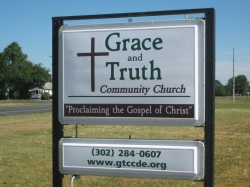There is a common method of evangelism that is used today referred to as the ABC’s of salvation. This seems to be common in evangelical circles and especially in para-church type youth ministries. The ABC is an acronym that is meant to be easy to remember for the average Christian who wants to tell others how they also may become Christians.
While there may be some variations, it generally goes something like this:
- Admit you are a sinner.
- Believe in Christ Jesus as God’s Son.
- Confess with your mouth that God raised him from the dead.
The proof text given for such a guideline is Romans 10:9-10 which says:
“because if you confess with your mouth that Jesus is Lord and believe in your heart that God raised him from the dead, you will be saved. For with the heart one believes and is justified, and with the mouth one confesses and is saved.” (Rom. 10:9-10)
On the basis of his verse, the three-step process is then offered to the non-Christian as the means by which they can become a Christian. The individual is then normally told that if they sincerely do these three things, they are a Christian. This all sounds very nice, and compact, and user-friendly. There is only one problem with this formula.
It isn’t true.
That is to say, it isn’t biblical. In fact, there is more than one way that this falls short of being a biblical presentation of the gospel. But for the sake of time and space, let me only deal with one very important error.
It is not true to say that a person must say something in order to become a Christian. In other words, confession with your mouth is NOT a step that needs to be taken in a process of becoming a Christian. This is a subtle, but serious, misrepresentation of the gospel.
The claim that a person has to say something in order to become a Christian is an example of a false gospel. The idea that your words contribute to your becoming a Christian is an example of works righteousness. In the context of Romans, Paul has already taught the doctrine of justification through faith alone (3:21ff). Faith obtains a “righteousness apart from works” (4:6). We are told that righteousness “will be counted to us who believe in him who raised from the dead Jesus our Lord” (4:24).
On the basis of this imputed righteousness, we are justified. If we are justified, then we are no longer condemned, and we never will be (8:1). The wrath of God has forever been removed from us (3:21-26). On the basis of our justification in Christ, we now have peace with God (5:1). For those who are justified, God’s love has been poured out into our hearts and we have been given the Holy Spirit (5:5). And all this through faith alone.
Now back to the assertion of the ABC’s of salvation…after we believe and are justified, this acronym would lead us to believe that we still need to say something in order to be saved. So is that right? Is it possible that we could be credited with Christ’s righteousness and we still are not yet Christians? That is what the ABC’s of salvation would tell us. This is the point where the ABC’s of salvation tells us we still need to say something that will get us over the threshold of becoming a Christian.
I truly hope that the error of this is very clear by now. A person is justified by faith alone. The ABC’ers have forgotten the old Reformation doctrine of sola fide, faith alone.
At this point, the question is understandably asked: “Well, what does Romans 10:9-10 mean then? After all, it says, ‘…with the mouth one confesses and is saved.'”
The context of Romans has already taught us that a person is a Christian when they are justified through faith alone. Now the question is, What does the term “salvation” mean in this verse? This is where people normally stumble. They assume “salvation” is equivalent with “justification” and on that basis they conclude that a person must verbalize a “confession” of some sort in order to become a Christian. But this assumption is wrong.
Salvation is not equivalent with justification. In Scripture, the term “salvation” has some flexibility in meaning. In other words, in Scripture we are told that believers have been saved (Eph. 2:5, 8), are being saved (1 Cor. 1:18; 2 Cor. 2:15) and will be saved (Matt. 10: 22; 24:13). So it’s meaning is often broader than simply the event of becoming a Christian. It can refer to the “whole package” of God’s entire saving work, if you will.
In the book of Romans specifically, Paul can use the term “salvation” to describe the ultimate consummation of our redemption and the glorification of the believer. Consider the following verses:
“Much more then, having now been justified by His blood, we shall be saved from the wrath of God through Him.” (5:9)
“And this do, knowing the time, that it is already the hour for you to awaken from sleep; for now salvation is nearer to us than when we believed.” (13:11)
There is a real sense, then, in which Christians are genuinely Christians (i.e. are justified), but not yet saved. This is exactly what Paul is talking about in Romans 10:9-10.
“because if you confess with your mouth that Jesus is Lord and believe in your heart that God raised him from the dead, you will be saved. For with the heart one believes and is justified, and with the mouth one confesses and is saved.” (Rom. 10:9-10)
When Paul says, “if you confess…you will be saved” he is not teaching that you must say something to be become a Christian. He is teaching the same thing that Jesus taught:
“But the one who endures to the end will be saved” (Matt. 10:22)
This statement by Jesus is not a statement about how to become a saint. This is a statement about the perseverance of the saints. In the same way, Paul teaches us that confession does follow faith (10:14). In fact, a life of confession follows faith. It is the confessing saint who perseveres in that confession who will ultimately be saved on the last day.






















Wow. I was just meditating on this exact thing earlier this evening as I’ve been studying up on some intense theological issues that are requiring some deep thinking. (Fun!) Interestingly enough, I had come to the conclusion about Romans 10:9 what you have posted on your blog here. That made me pretty excited. I started reading your post and couldn’t wait to get to the end. Thanks again Billy for a good blog post! As always, very helpful and encouraging to me!
Rachel,
Thanks! May the Lord continue to bless your study of his word.
Billy